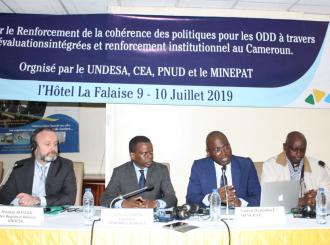
Yaounde, 9 July 2019 (ECA) – New models and tools to help government services pre-empt unproductive competition between food, water, energy and climate change policies and strategies are being introduced in Cameroon thanks to joint efforts of United Nations Department of Economic and Social Affairs (UNDESA), the UN Economic Commission for Africa (ECA) and United Nations Development Programme (UNDP).
In response to a request from Cameroon’s Ministry of Economy, Planning and Regional Development (MINEPAT), the three UN bodies have convened a two-day workshop to support the Government in transitioning from sectoral to integrated policy-making in Climate, Land, Energy and Water systems (CLEWs), which started this morning in Yaounde. It is an integral part of the UN project titled “Enhancing policy coherence for the SDGs through integrated assessments and institutional strengthening in Africa.”
Exchanges will contribute to the crafting of a training program in the use of the CLEWs modelling tool to inform sustainable development policies and to build a system that supports institutional arrangements for collaboration and coordination among ministries in the integrated assessment and evaluation of climate, land, energy and water policies and strategies.
“It is not news that African countries have contributed the least to anthropogenic greenhouse gas emissions, yet the continent is already being severely impacted by the adverse effects of climate change, particularly in the Climate sensitive sectors such as agriculture, water and energy; which its economies are strongly dependent on,” Said Antonio Pedro – Head of ECA’s Office for Central Africa at the opening of the workshop.
“Therefore, building sustainable and resilient economies in support of Africa’s transformation - as summarized in the UN 2030 Agenda for Sustainable Development (leave no one behind) and Africa’s bigger Agenda 2063 (the Africa We Want) - does require climate-informed and integrated strategies and approaches with a focus on the climate, land, energy and water sectors nexus.”
Pedro praised Cameroon for decisively developing its nationally determined contribution to climate action (NDC) under the Paris climate treaty, with targets such as the reduction of greenhouse gas emissions by 32%, compared to the baseline scenario, by 2035 and improving energy efficiency with 25% renewable energy.
He noted that this commitment to resilience against climate change, which he described as Africa’s current biggest challenge, alongside huge investments in agriculture, infrastructure, energy and water, can be thrown in jeopardy if integrated assessment approaches and institutional collaboration are not adopted.
Meanwhile Thomas Alfstad, Inter-regional Advisor at UNDESA rejoiced that the workshop as well as other activities of the “enhancing policy coherence for the SDGs through integrated assessments and institutional strengthening in Africa” project will establish a framework for continuously and coherently tackling issues on food security, energy security, water security and the climate change challenge by national administrative services.
Speaking on behalf of the Cameroon’s Ministry of the Economy, Planning and Regional Development, Dr Saïdou Hamadou underscored the importance of integrated planning for development. He said this joint UN project is timely because it would contribute ideas to be fed into the successor of Cameroon’s Growth and Employment Strategy Paper which expires at the end of 2019, to make way for a new planning instrument within the framework of the country’s 2035 emergence vision.
After the workshop, the UN team facilitating the project will conduct bilateral meetings with the different counterparts to follow-up on specific issues and challenges for implementing the project, notably the data challenge from across administrative services that inform the analytical tools and collaborative policy synergies being developed.
-END-
Media Contact
Abel Akara Ticha – Chargé de communication
Commission économique des Nations Unies pour l’Afrique
637, rue 3.069, Quartier du Lac, Yaoundé
Tél: 237 222504348
E-mail: akara@un.org